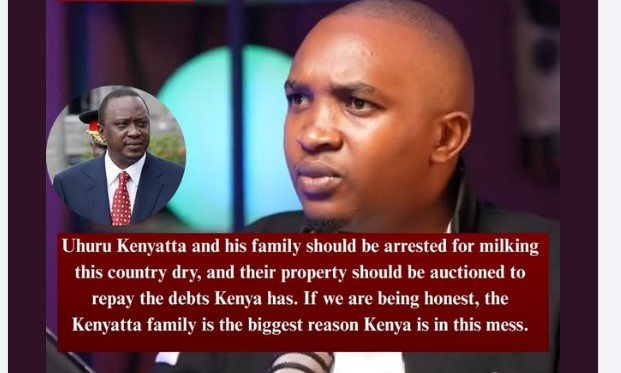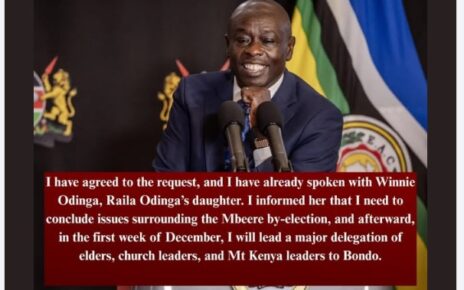Political commentator Morara Kebaso has sparked intense debate after boldly declaring that former President Uhuru Kenyatta and his family should be arrested for allegedly “milking the country dry,” arguing that their property ought to be auctioned to repay Kenya’s ballooning debt. His statement, emotionally charged and politically provocative, adds new fuel to the long-running national conversation about corruption, accountability, and the role of Kenya’s political dynasties in shaping the country’s economic trajectory.
Kebaso’s remarks reflect a growing frustration among Kenyans who feel crushed under the weight of taxes, inflation, and public debt. In his view, the Kenyatta family — one of the wealthiest and most influential families in East Africa — bears a significant share of responsibility for the economic challenges Kenya is currently facing. By saying “the Kenyatta family is the biggest reason Kenya is in this mess,” Kebaso taps into a sentiment that has been circulating in political circles: that decades of leadership by powerful families have left deep structural financial wounds.
However, his call for arrests and asset seizures is not merely an expression of anger; it is a dramatic demand for accountability, the kind of accountability many Kenyans feel they have never truly seen. For years, conversations around wealth accumulated by political elites have remained sensitive, guarded, and often clouded by tribal and political loyalties. Kebaso’s bluntness breaks that silence, forcing the country to confront uncomfortable questions.
His statement also speaks to a broader ideological clash about how to address historical injustices and economic mismanagement. Should past leaders be held personally responsible for national debt? Can a country realistically recover by targeting individuals, however powerful? Or does this approach risk turning political disagreements into witch-hunts?
The Kenyatta family, for its part, has consistently denied wrongdoing, maintaining that its businesses are legitimate and that it contributed positively to Kenya’s development. Yet public trust remains divided, especially among those who believe that Kenya’s political and economic systems have long been captured by elite interests.
Kebaso’s comments also highlight the shifting political landscape under President William Ruto. The seeming openness with which such criticisms are voiced suggests a growing willingness among some leaders and commentators to question previously untouchable figures in Kenya’s political history. Whether driven by genuine accountability or political realignment, the effect is the same: the Kenyatta legacy is being re-examined with unprecedented intensity.
Ultimately, Kebaso’s statement forces the nation into a deeper reflection. It challenges Kenya to think critically about corruption, wealth, historical privilege, and economic justice. Whether one agrees with his extreme prescription or not, his words underscore a truth many Kenyans feel: the country cannot move forward without confronting the past.



